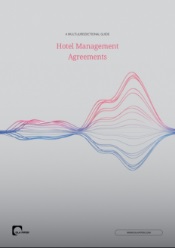NDAs are included in HMAs if the operator intends to take up a loan regarding activities of the hotel. However, they are not a decisive factor during the negotiation of HMAs in comparison to fees, performance clauses and termination rights.
Yes. Virtually all HMAs contain an NDA.
NDA clauses are commonly required but are not subject to registration and do not bind third parties.
NDAs are common where there is financing, but this depends on the bank, owner and operator.
No. It is very hard to negotiate with the creditor (eg banks) with dominating bargaining power to enter into any NDA.
No.
Yes.
This is rather unusual in Germany in its original sense. However, lease agreements for large upscale/luxury hotels and even some HMAs foresee so-called tenant easements, which are registered in the land register and grant the tenant and/or the HMA holder security in case of an insolvency of the landlord.
No. Some operators will want the benefit of an NDA to secure the enforceability of the HMA by requiring the owner to enter into a Deed of Non-Disturbance in the event the owner provides any security to a lender in respect of the hotel.
Yes, an NDA is usually obtained if the property is financed.
Yes, NDAs or comfort letters are required where there is finance and a management agreement.
Branded operators usually request non-disturbance agreements which shall be negotiated from time to time and are not likely to be released by banks or third parties.
It depends on each case. But, it is not common in Japan for a bank to agree to an NDA.
No.
Yes; however, this may be a hard discussion with financial institutions especially in the case of breach of the loan.
Yes, usually an NDA forms part of the HMA.
This depends on the situation. In general, it is difficult to achieve satisfying financing in Norway based on properties with an HMA, even with an NDA.
No.
It will depend on the bank and on the operator. Please note that there may be some legal restraints that may make it impossible to execute.
This depends on the bank and the operator/owner.
This will depend on the operator and the bank. The use of NDAs has grown a lot in practice in recent years.
It is not standard, but it is not unheard of, and the idea is becoming slightly more common.
No, but operators typically require owners to use best efforts to obtain an NDA.
This will depend on the operator and the bank. The use of NDAs has grown a lot in practice in recent years.
This depends on the bank and the operator. Traditionally, NDAs have always been required where there is finance and a management agreement.
Yes, and typically the agreement includes subordination, as well as non-disturbance (SNDA). SNDAs are highly negotiated between the lender and the operator, and vary depending on the strength of the lender, the owner and the brand. Key issues tend to revolve around lender exercise of remedies upon loan default, control of accounts under the operating agreement and transfer provisions.

Australia
Are Hotel Management Agreements (HMAs) common in the jurisdiction?
Yes. HMAs are a common owner/operator structure used in Australia.
If not HMAs, what are the alternatives / what is commonly used?
Other alternative approaches are:
- Franchise agreements – operators enter into franchise agreements with well-known domestic or international hotel chains under which the chain provides a business system, services and licenses the use of the brand and other IP of the hotel chain. The property at which the hotel is operated may be owned by the operator or another party (which may be an entity related to the franchisor). The fee structures may vary and may be made up of a number of components, including royalties for the use of IP, other fixed charges, fees for services and/or fees based on revenue/performance of the hotel business.
- Leases – owners lease the underlying asset to an operator on a long-term basis (under which a fixed lease payment is payable), and the operator operates the hotel business autonomously, or occupies the hotel under the lease, with the HMA regulating the operation of the Hotel.
Is it common or usual for the HMA to be governed by (i) local laws; (ii) the laws of one of the parties' country of incorporation; or (iii) an alternative jurisdiction?
HMAs are typically governed by Australian law. Australia is regarded as a relatively stable legal jurisdiction, such that the sovereign risk and legal risks associated with use of Australia law are limited.
Are there any significant or unusual points to note in respect of tax on HMA payments in the jurisdiction?
HMA payments made to the operator by the owner, and/or any rental payments under a lease of the Hotel property are subject to the Australian Goods and Services Tax (GST).
Download this country guide in PDF format:


Australia
Is there a standard contract period of an HMA?
The duration of HMAs depends in part on the bargaining position of the operator – for major operators, terms of 20+ years are not uncommon. The duration also depends on the nature of the assets, with landmark assets often attracting longer terms.
Is the term usually fixed? Are early exit or similar options included (contractual or implied)?
The term is usually fixed.
It is increasingly common to integrate early exit mechanisms where operators underperform for a sustained period. This is in addition to standard early termination rights, such as for an insolvency event (eg liquidation, receivership, statutory winding up) or where a third party brings any claim or commences proceeding relating to the owner's title to the hotel or land.
Is it usual to include fees / liquidated damages for early termination?
Exit fees for early termination for convenience (ie without cause) or on sale of the property by the owner, and excluding termination in the case of manager default, are common. The level of termination fees/liquidated can vary depending on a number of commercial factors (eg location, type of hotel, market position of brand) and the reason for early termination (ie for convenience vs where the property is sold).
What is the usual position in respect of renewal?
It is common to have renewal periods that are subject to agreement between the parties; options that are exercisable unilaterally are less common. Renewal periods vary depending on the operator and are driven by their own operational needs. Renewal periods as part of an HMA are often negotiated as part of any agreed future capital improvement program for the hotel asset.

Australia
Is there a standard fee structure for HMAs (eg base + incentive)?
HMA fee structures typically comprise a percentage of gross annual revenue (base fees), and a sliding scale percentage of the adjusted gross operating profit, where the operator meets profitability thresholds (incentive fee). The fee structure will depend on various factors including the extent to which the operator or the hotel owner contribute to capital and operational costs of the hotel over the term of the HMA.
What other fees and charges are there (such as royalties, accounting, marketing, license fees, etc.)?
Depending on the parties and type of hotel, marketing contributions and/or fees for use of services such as accounting, software, reservation networks or intellectual property (including branding) may be payable.
Are owners typically required to set aside funds for fixtures and fittings?
Yes. Owners are typically required to make furniture, fitting and equipment (FF&E) contributions for general repairs and maintenance of the hotel, and any other budgeted capital expenditures.

Australia
What are the standard rights / restrictions in respect of transfer / sale of the hotel?
The rights and restrictions applicable to the transfer/sale of the hotel depend on the operator and the asset. For major operators and/or landmark assets, the consent of the operator is commonly required for the hotel to be sold or transferred. Otherwise, the owner is usually permitted to transfer or sell the hotel without the consent of the operator.
When a managed hotel is sold (either asset or share deal), is it usual in the jurisdiction that either the Operator's consent is required for the sale, or that the hotel may only be sold if the HMA transfers with the hotel?
Both. In relation to the requirement for the consent of the operator, see above – it depends on the operator and the asset; however, commonly with marquee hotels operated by international hotel operators, their consent is usually required, and commonly provided if the purchaser agrees to be bound by the HMA following the sale of the hotel.
Whether this is the case with other operators, or if the owner can sell the hotel property with vacant possession will depend on the terms of the HMA.
For taxation reasons, hotels are commonly sold with the HMAs in place, even if these can be terminated after settlement. Taxation advice should be sought as part of any hotel acquisition or disposal.
Do HMAs commonly include a right of first refusal for the operator to purchase the hotel?
It depends on the operator and the asset. Some operators also own hotels and therefore like to have a first right of refusal, while other organizations that are simply operators do not seek such a right.
Is it usual to include provisions which enable the sale of the property with vacant possession ie without the brand?
As above, these depends on the terms of the HMA and the operator. There are different tax consequences arising if the hotel property is sold with vacant possession and taxation advice should be sought as part of any hotel disposal.
